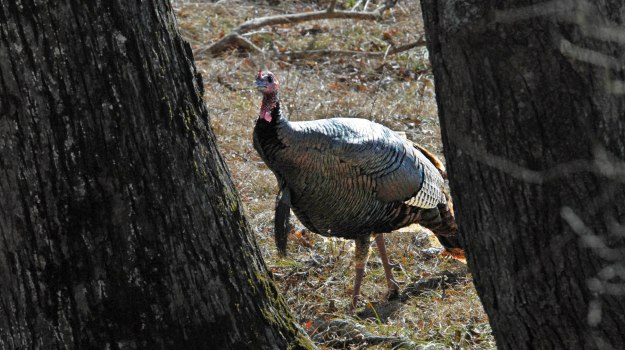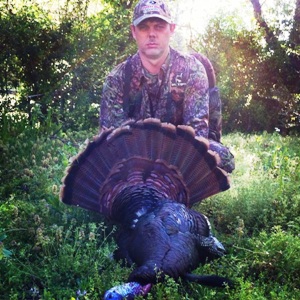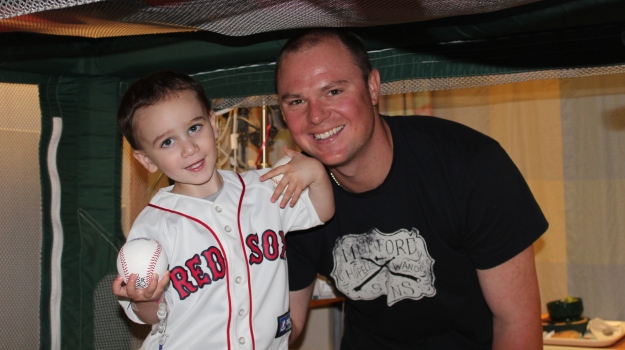by Robert Prowell | Mossy Oak ProStaff

With another new turkey season here, it brings with it another new crop of hunters. If you're new to turkey hunting, I am sure you have watched all the latest DVDs and read all the newest magazine articles on everything turkey. I would like to share a few tips for you first-time turkey chasers.
Hopefully with your preseason scouting you have located several different gobblers to chase during the season. When the time arrives to begin my hunt, during first light I like to let the woods wake up. I will give it time to let the turkey hopefully gobble on his own before making a call. How much time depends on the morning. If it's a still calm morning, I might wait maybe 10 minutes after first light. I'll start off with an owl hooter and give four to five hoots and wait. If nothing, then I'll get more aggressive and hoot five or six times and throw some laughs in. If that got a response I will try to get set up within 100 yards of him or closer if there is enough foliage to allow it.
Head to toe camo is a must in turkey hunting. Early in the spring season I dress in Mossy Oak Break-Up Infinity and later in the season as the woods start to green up, I switch to the Obsession pattern.
 The object of the hunt is to call an ol' tom into your set up. If you're new to calling, I would recommend trying to learn to blow a mouth diaphragm. If you are having trouble and just can't use it, on the next call I would suggest a slate call. They are relatively easy to run with some practice. Start out learning to yelp and cluck. Learn to call soft and mix up your calling. You don't want your calling to be repetitious. And don't call too much. Let the turkeys dictate what they want hear. If they're not very vocal then you don't want to be calling a lot. Just some soft yelps and clucks.
The object of the hunt is to call an ol' tom into your set up. If you're new to calling, I would recommend trying to learn to blow a mouth diaphragm. If you are having trouble and just can't use it, on the next call I would suggest a slate call. They are relatively easy to run with some practice. Start out learning to yelp and cluck. Learn to call soft and mix up your calling. You don't want your calling to be repetitious. And don't call too much. Let the turkeys dictate what they want hear. If they're not very vocal then you don't want to be calling a lot. Just some soft yelps and clucks.
You don't have to be a champion caller to call a turkey in, but I think it does help - especially if you hunt pressured birds - to sound as realistic as possible. I work for a game call company and my job is to promote and sell calls. But one of the best calls you can do does not cost a thing and that is mimicking a bird scratching in the leaves. I do it when there might be a bird below a hill or just out of sight of me. Never do it when you can see the turkey, because he will pick your movement up and be out of there.
Patience kills more turkeys than anything you can do. If you are not patient and cannot sit still, you probably won't be a very successful turkey hunter. A favorite tactic I use if I haven't been successful taking a bird first thing off the roost, is blind calling. Find a spot you know the turkeys are using and set up, get comfortable and call every 10 to 15 minutes .This takes patience and you have to be able to remain still because it could be a long sit. If you employ this hunting situation and are prone to moving around, I would suggest a blind.
Decoys are another option to try and lure an old gobbler into gun range. Do they work all the time? Of course not. But they do work. I use decoys on some hunts. Sometimes a single hen, sometimes a hen and jake and other times a hen and strutter. I've killed dozens of turkeys without using decoys, and I've killed dozens of turkeys with the aid of them. I think a decoy to a new hunter is optional, but I would recommend one just to keep the focus off of you. There are a lot of decoys on the market, but I would suggest one that looks as realistic as you can find.
You owe it to the turkey to pattern your gun. In years past I have guided hunters that have missed sure-kill shots only to find out they never patterned their gun. They bought the tightest choke tube and a box of turkey loads and went hunting not knowing what the gun would do. It is all of our responsibility to make the most humane shot possible.
There are endless other tactics, calls and gadgets for turkey hunting that were not discussed and the reason is simple. Don't make your first year of turkey hunting complicated. Learn the basic calls, learn as much as you can about turkey behavior, and pattern your gun. Try to hunt with an experienced hunter to see what he or she does or doesn't do in the turkey woods. Then in a few years when you have some of experience under your belt, pass it on.
Robert Prowell is on the ProStaff under Patrick Hall. He lives in Kentucky, has won regional and state owl hooting and turkey calling contest.



























